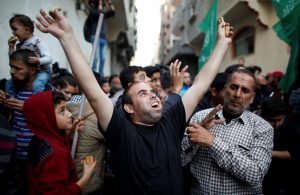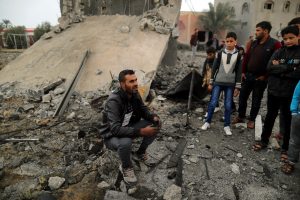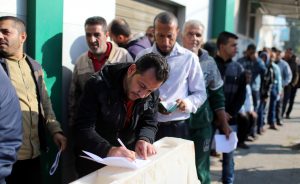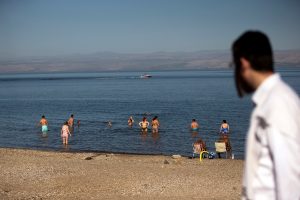
By Dan Williams
JERUSALEM (Reuters) – Israeli Defence Minister Avigdor Lieberman announced his resignation on Wednesday in protest at a Gaza ceasefire that he called a “capitulation to terror”, weakening Prime Minister Benjamin Netanyahu’s conservative coalition government.
“Were I to stay in office, I would not be able to look southern residents in the eye,” Lieberman told reporters, referring to Israelis subjected to a surge in Palestinian rocket attacks before Tuesday’s truce took hold.
Lieberman said his resignation, which will go into effect 48 hours after he submits a formal letter to Netanyahu, also withdraws his far-right Israel Beitenu party from the coalition.
Netanyahu will take over the defense portfolio himself, his party said. The loss of Israel Beitenu’s five seats will leave him with control of just 61 of the 120 seats in parliament, a year before Israel’s next election.
Political commentators had speculated that Netanyahu, who has high approval ratings despite being dogged by multiple corruption investigations, might bring forward the ballot.
They also saw in Lieberman’s decision to quit a bid to poach votes from Netanyahu and far-right cabinet rival Naftali Bennett of the Jewish Home party, ahead of an election.
Netanyahu’s Likud played down the option of an early poll.
“There is no need to go to an election during what is a sensitive period for national security. This government can see out its days,” party spokesman Jonatan Urich said on Twitter.

A Palestinian gestures as he holds sweets during a rally celebrating the resignation of Israel’s Defence Minister Avigdor Lieberman, in Gaza City November 14, 2018. REUTERS/Suhaib Salem
CRACKS IN COALITION
The cracks in the coalition could soon widen, however.
In Jewish Home, which has eight lawmakers, there were calls for Bennett, now education minister, to succeed Lieberman as defense chief.
Bennett did not immediately comment. Were he to withdraw from the ruling coalition, a snap election would be inevitable. But as defense minister, he could be no less a thorn in Netanyahu’s side than Lieberman.
Lieberman and Bennett have spoken in favor of harsh Israeli military action against Gaza’s dominant Hamas Islamists, even as the government authorized a Qatari cash infusion to the impoverished enclave last week and limited itself to air strikes rather than a wider campaign during this week’s fighting.
Israel has fought three wars in Gaza since Hamas took over the enclave in 2007.
Violence persisted on lower scale on Wednesday, with Palestinians saying a Gaza fisherman was shot dead by Israeli forces. An Israeli military spokeswoman said the troops across the border identified a suspect approaching the Gaza fence and opened fire at him.
In a separate incident, the military said troops captured a Palestinian who tried to cut through the fence and threw grenades at them.
Netanyahu cast Israel’s handling of Gaza as prudence.
“Leadership also means standing up to criticism when you know things that are classified and which you cannot share with the public that you love,” he said in a speech. “Our enemies begged for a ceasefire, and they know well why.”
Hamas saw victory in the Lieberman’s departure. On Gaza City streets, Palestinian burned Lieberman’s photo and some motorists handed out candies to passersby in celebration.
“Lieberman’s resignation is a recognition of the defeat before the growing force of the Palestinian resistance,” said Hamas spokesman Sami Abu Zuhri. “It also showed a state of weakness that has overcome the Israelis.”
Born in the former Soviet Union, Lieberman established an electoral base among fellow Russian-speaking immigrants. He also counts among his supporters other Israeli Jews who share his suspicions of Israel’s Arab minority or oppose the religious authority and political clout of ultra-Orthodox rabbis.
(Additional reporting by Maayan Lubell and Nidal al-Mughrabi; Editing by Jeffrey Heller, Peter Graff, Richard Balmforth)













